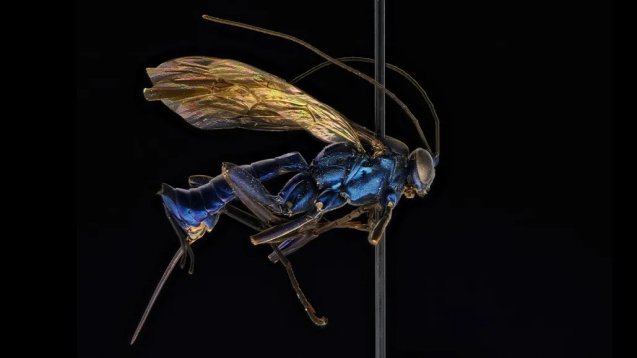Surprisingly Abundant Parasitic Wasps Found in Brazilian Mountain

The tropical regions bustle with an abundant life forms, often having a higher number of species than comparatively cooler environments near the poles. However, the Darwin wasps, which are a specific type of insects, were previously believed to deviate from this notion.
Researchers who analysed wasp diversity in the UK and the US vis-à-vis tropical regions during the 1970s and 1980s formed the opinion that these wasps showed highest diversity at mid-latitudes, such as in Kentucky or England. However, some believed that enough research was not conducted in the tropical areas.
Peter Mayhew, a biologist from the University of York in England, took it upon himself to conduct research in the tropical rainforest. He found it easier to study wasps in a British garden than in the rainforest, owing to the numerous challenges in the latter.
After extensive years of sorting out wasps obtained from a single mountain located in the Brazilian Atlantic rainforest, Mayhew and his team managed to identify nearly 100 Darwin wasp species. According to their findings published in the journal Insects on November 7, the tropical regions shelter more kinds of this wasp than ascertained before.
Darwin wasps, belonging to the family of parasitic wasps (Ichneumonidae), lay their eggs on or within other pests, preparing a ready meal for the larvae that hatch subsequently. Acting as apex predators, these wasps manage their prey populations, serving an important ecological function just like wolves and sharks. In terms of described species, Darwin wasps surpass the number of recognized bird and mammal species, having over 25,000.
To figure out possible dwellings for these wasps in the tropical regions, Mayhew and his Brazilian associates set off on multiple hikes. They installed pairs of traps, known as Malaise traps, at 15 different locations on their way up a mountain lying within Brazil’s Serra dos Órgãos National Park. Initially, they transported the traps along a road, which was relatively easy.
Nonetheless, later stages of the journey required hand-carrying the traps through the jungle, a task Mayhew fondly refers to as “pure hell”, characterized by extreme steepness, heat and humidity. At regular intervals of a month for an entire year, they returned to replace the old traps with new ones.
As anticipated, the rainforest was teeming with creatures, causing the alcohol jar within each trap to transform into an “insect soup”. To simplify the task for now, they decided to focus on half of the sample jars and specifically inspect for a subfamily of Darwin wasps known as the pimplines.
With the assistance of several undergraduates and taxonomist Ilari Sääksjärvi from Finland’s University of Turku, they identified 98 pimpline species, only 24 of which were previously described and named. Intriguingly, the count of pimpline species decreased as they went uphill on the mountain, with the species found on higher elevations not found lower down. In terms of comparison, the UK has 109 known pimpline species, and wasp diversity there has been researched more extensively than in Brazil.
In light of this study, Mayhew suggests conservation measures targeting middle to low elevations in the tropical regions to preserve the wasps’ significant ecological role and protect maximum Darwin wasp diversity. He adds that such regions could possibly have plenty of these wasps.
Laura Timms, a conservation biologist not involved in this research, refers to this new study as more proof of the impressive, yet unexplored, diversity of this fascinating group of wasps in the tropics, pushing for more research.
Mayhew plans to continue his research by studying the diversity of other types of Darwin wasps found in the “insect soup”. He also indicates that the variety of creatures trapped could provide useful information to researchers focusing on different types of insects, such as leaf beetles and fireflies, as “much of what’s in the bottles is going to be new to science”.




